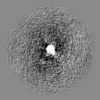+ Open data
Open data
- Basic information
Basic information
| Entry |  | |||||||||
|---|---|---|---|---|---|---|---|---|---|---|
| Title | SpRY-Cas9:gRNA complex targeting TAC PAM DNA with 10 bp R-loop | |||||||||
 Map data Map data | ||||||||||
 Sample Sample |
| |||||||||
 Keywords Keywords | SpRY-Cas9 / CRISPR / Cas9 / IMMUNE SYSTEM / R-loop | |||||||||
| Function / homology |  Function and homology information Function and homology informationmaintenance of CRISPR repeat elements / 3'-5' exonuclease activity / DNA endonuclease activity / defense response to virus / Hydrolases; Acting on ester bonds / DNA binding / RNA binding / metal ion binding Similarity search - Function | |||||||||
| Biological species |  Streptococcus pyogenes (bacteria) / Streptococcus pyogenes (bacteria) /  Escherichia phage Lambda (virus) Escherichia phage Lambda (virus) | |||||||||
| Method | single particle reconstruction / cryo EM / Resolution: 3.28 Å | |||||||||
 Authors Authors | Hibshman GN / Bravo JPK / Taylor DW | |||||||||
| Funding support |  United States, 2 items United States, 2 items
| |||||||||
 Citation Citation |  Journal: Nat Commun / Year: 2024 Journal: Nat Commun / Year: 2024Title: Unraveling the mechanisms of PAMless DNA interrogation by SpRY-Cas9. Authors: Grace N Hibshman / Jack P K Bravo / Matthew M Hooper / Tyler L Dangerfield / Hongshan Zhang / Ilya J Finkelstein / Kenneth A Johnson / David W Taylor /   Abstract: CRISPR-Cas9 is a powerful tool for genome editing, but the strict requirement for an NGG protospacer-adjacent motif (PAM) sequence immediately next to the DNA target limits the number of editable ...CRISPR-Cas9 is a powerful tool for genome editing, but the strict requirement for an NGG protospacer-adjacent motif (PAM) sequence immediately next to the DNA target limits the number of editable genes. Recently developed Cas9 variants have been engineered with relaxed PAM requirements, including SpG-Cas9 (SpG) and the nearly PAM-less SpRY-Cas9 (SpRY). However, the molecular mechanisms of how SpRY recognizes all potential PAM sequences remains unclear. Here, we combine structural and biochemical approaches to determine how SpRY interrogates DNA and recognizes target sites. Divergent PAM sequences can be accommodated through conformational flexibility within the PAM-interacting region, which facilitates tight binding to off-target DNA sequences. Nuclease activation occurs ~1000-fold slower than for Streptococcus pyogenes Cas9, enabling us to directly visualize multiple on-pathway intermediate states. Experiments with SpG position it as an intermediate enzyme between Cas9 and SpRY. Our findings shed light on the molecular mechanisms of PAMless genome editing. | |||||||||
| History |
|
- Structure visualization
Structure visualization
| Supplemental images |
|---|
- Downloads & links
Downloads & links
-EMDB archive
| Map data |  emd_41079.map.gz emd_41079.map.gz | 108.1 MB |  EMDB map data format EMDB map data format | |
|---|---|---|---|---|
| Header (meta data) |  emd-41079-v30.xml emd-41079-v30.xml emd-41079.xml emd-41079.xml | 19.5 KB 19.5 KB | Display Display |  EMDB header EMDB header |
| Images |  emd_41079.png emd_41079.png | 68.2 KB | ||
| Filedesc metadata |  emd-41079.cif.gz emd-41079.cif.gz | 7.3 KB | ||
| Others |  emd_41079_half_map_1.map.gz emd_41079_half_map_1.map.gz emd_41079_half_map_2.map.gz emd_41079_half_map_2.map.gz | 200.7 MB 200.7 MB | ||
| Archive directory |  http://ftp.pdbj.org/pub/emdb/structures/EMD-41079 http://ftp.pdbj.org/pub/emdb/structures/EMD-41079 ftp://ftp.pdbj.org/pub/emdb/structures/EMD-41079 ftp://ftp.pdbj.org/pub/emdb/structures/EMD-41079 | HTTPS FTP |
-Validation report
| Summary document |  emd_41079_validation.pdf.gz emd_41079_validation.pdf.gz | 943.9 KB | Display |  EMDB validaton report EMDB validaton report |
|---|---|---|---|---|
| Full document |  emd_41079_full_validation.pdf.gz emd_41079_full_validation.pdf.gz | 943.4 KB | Display | |
| Data in XML |  emd_41079_validation.xml.gz emd_41079_validation.xml.gz | 15.4 KB | Display | |
| Data in CIF |  emd_41079_validation.cif.gz emd_41079_validation.cif.gz | 18.1 KB | Display | |
| Arichive directory |  https://ftp.pdbj.org/pub/emdb/validation_reports/EMD-41079 https://ftp.pdbj.org/pub/emdb/validation_reports/EMD-41079 ftp://ftp.pdbj.org/pub/emdb/validation_reports/EMD-41079 ftp://ftp.pdbj.org/pub/emdb/validation_reports/EMD-41079 | HTTPS FTP |
-Related structure data
| Related structure data | 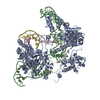 8t6sMC 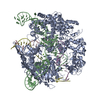 8spqC  8sqhC 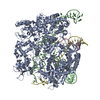 8srsC 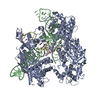 8t6oC  8t6pC 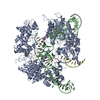 8t6tC 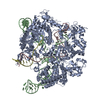 8t6xC  8t6yC  8t76C 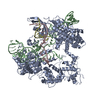 8t77C  8t78C  8t79C  8t7sC  8tzzC  8u3yC M: atomic model generated by this map C: citing same article ( |
|---|---|
| Similar structure data | Similarity search - Function & homology  F&H Search F&H Search |
- Links
Links
| EMDB pages |  EMDB (EBI/PDBe) / EMDB (EBI/PDBe) /  EMDataResource EMDataResource |
|---|---|
| Related items in Molecule of the Month |
- Map
Map
| File |  Download / File: emd_41079.map.gz / Format: CCP4 / Size: 216 MB / Type: IMAGE STORED AS FLOATING POINT NUMBER (4 BYTES) Download / File: emd_41079.map.gz / Format: CCP4 / Size: 216 MB / Type: IMAGE STORED AS FLOATING POINT NUMBER (4 BYTES) | ||||||||||||||||||||||||||||||||||||
|---|---|---|---|---|---|---|---|---|---|---|---|---|---|---|---|---|---|---|---|---|---|---|---|---|---|---|---|---|---|---|---|---|---|---|---|---|---|
| Projections & slices | Image control
Images are generated by Spider. | ||||||||||||||||||||||||||||||||||||
| Voxel size | X=Y=Z: 0.8332 Å | ||||||||||||||||||||||||||||||||||||
| Density |
| ||||||||||||||||||||||||||||||||||||
| Symmetry | Space group: 1 | ||||||||||||||||||||||||||||||||||||
| Details | EMDB XML:
|
-Supplemental data
-Half map: #2
| File | emd_41079_half_map_1.map | ||||||||||||
|---|---|---|---|---|---|---|---|---|---|---|---|---|---|
| Projections & Slices |
| ||||||||||||
| Density Histograms |
-Half map: #1
| File | emd_41079_half_map_2.map | ||||||||||||
|---|---|---|---|---|---|---|---|---|---|---|---|---|---|
| Projections & Slices |
| ||||||||||||
| Density Histograms |
- Sample components
Sample components
-Entire : Ternary complex of SpRY-Cas9 with gRNA and NAC PAM DNA after one ...
| Entire | Name: Ternary complex of SpRY-Cas9 with gRNA and NAC PAM DNA after one minute of DNA incubation with 10 bp R-loop |
|---|---|
| Components |
|
-Supramolecule #1: Ternary complex of SpRY-Cas9 with gRNA and NAC PAM DNA after one ...
| Supramolecule | Name: Ternary complex of SpRY-Cas9 with gRNA and NAC PAM DNA after one minute of DNA incubation with 10 bp R-loop type: complex / ID: 1 / Parent: 0 / Macromolecule list: all |
|---|---|
| Source (natural) | Organism:  Streptococcus pyogenes (bacteria) Streptococcus pyogenes (bacteria) |
| Molecular weight | Theoretical: 211.54 KDa |
-Macromolecule #1: CRISPR-associated endonuclease Cas9/Csn1
| Macromolecule | Name: CRISPR-associated endonuclease Cas9/Csn1 / type: protein_or_peptide / ID: 1 / Number of copies: 1 / Enantiomer: LEVO / EC number: Hydrolases; Acting on ester bonds |
|---|---|
| Source (natural) | Organism:  Streptococcus pyogenes (bacteria) Streptococcus pyogenes (bacteria) |
| Molecular weight | Theoretical: 159.149406 KDa |
| Recombinant expression | Organism:  |
| Sequence | String: EDKKYSIGLD IGTNSVGWAV ITDEYKVPSK KFKVLGNTDR HSIKKNLIGA LLFDSGETAE RTRLKRTARR RYTRRKNRIC YLQEIFSNE MAKVDDSFFH RLEESFLVEE DKKHERHPIF GNIVDEVAYH EKYPTIYHLR KKLVDSTDKA DLRLIYLALA H MIKFRGHF ...String: EDKKYSIGLD IGTNSVGWAV ITDEYKVPSK KFKVLGNTDR HSIKKNLIGA LLFDSGETAE RTRLKRTARR RYTRRKNRIC YLQEIFSNE MAKVDDSFFH RLEESFLVEE DKKHERHPIF GNIVDEVAYH EKYPTIYHLR KKLVDSTDKA DLRLIYLALA H MIKFRGHF LIEGDLNPDN SDVDKLFIQL VQTYNQLFEE NPINASGVDA KAILSARLSK SRRLENLIAQ LPGEKKNGLF GN LIALSLG LTPNFKSNFD LAEDAKLQLS KDTYDDDLDN LLAQIGDQYA DLFLAAKNLS DAILLSDILR VNTEITKAPL SAS MIKRYD EHHQDLTLLK ALVRQQLPEK YKEIFFDQSK NGYAGYIDGG ASQEEFYKFI KPILEKMDGT EELLVKLNRE DLLR KQRTF DNGSIPHQIH LGELHAILRR QEDFYPFLKD NREKIEKILT FRIPYYVGPL ARGNSRFAWM TRKSEETITP WNFEE VVDK GASAQSFIER MTNFDKNLPN EKVLPKHSLL YEYFTVYNEL TKVKYVTEGM RKPAFLSGEQ KKAIVDLLFK TNRKVT VKQ LKEDYFKKIE CFDSVEISGV EDRFNASLGT YHDLLKIIKD KDFLDNEENE DILEDIVLTL TLFEDREMIE ERLKTYA HL FDDKVMKQLK RRRYTGWGRL SRKLINGIRD KQSGKTILDF LKSDGFANRN FMQLIHDDSL TFKEDIQKAQ VSGQGDSL H EHIANLAGSP AIKKGILQTV KVVDELVKVM GRHKPENIVI EMARENQTTQ KGQKNSRERM KRIEEGIKEL GSQILKEHP VENTQLQNEK LYLYYLQNGR DMYVDQELDI NRLSDYDVDH IVPQSFLKDD SIDNKVLTRS DKNRGKSDNV PSEEVVKKMK NYWRQLLNA KLITQRKFDN LTKAERGGLS ELDKAGFIKR QLVETRQITK HVAQILDSRM NTKYDENDKL IREVKVITLK S KLVSDFRK DFQFYKVREI NNYHHAHDAY LNAVVGTALI KKYPKLESEF VYGDYKVYDV RKMIAKSEQE IGKATAKYFF YS NIMNFFK TEITLANGEI RKRPLIETNG ETGEIVWDKG RDFATVRKVL SMPQVNIVKK TEVQTGGFSK ESIRPKRNSD KLI ARKKDW DPKKYGGFLW PTVAYSVLVV AKVEKGKSKK LKSVKELLGI TIMERSSFEK NPIDFLEAKG YKEVKKDLII KLPK YSLFE LENGRKRMLA SAKQLQKGNE LALPSKYVNF LYLASHYEKL KGSPEDNEQK QLFVEQHKHY LDEIIEQISE FSKRV ILAD ANLDKVLSAY NKHRDKPIRE QAENIIHLFT LTRLGAPRAF KYFDTTIDPK QYRSTKEVLD ATLIHQSITG LYETRI DLS QLGGDG UniProtKB: CRISPR-associated endonuclease Cas9/Csn1 |
-Macromolecule #2: gRNA
| Macromolecule | Name: gRNA / type: rna / ID: 2 / Number of copies: 1 |
|---|---|
| Source (natural) | Organism:  Streptococcus pyogenes (bacteria) Streptococcus pyogenes (bacteria) |
| Molecular weight | Theoretical: 29.108346 KDa |
| Sequence | String: AAGAUGAGAC GCGUUUUAGA GCUAGAAAUA GCAAGUUAAA AUAAGGCUAG UCCGUUAUCA ACUUGAAAAA GUGGCACCGA GUCGGUGCU U |
-Macromolecule #3: TS
| Macromolecule | Name: TS / type: dna / ID: 3 / Number of copies: 1 / Classification: DNA |
|---|---|
| Source (natural) | Organism:  Escherichia phage Lambda (virus) Escherichia phage Lambda (virus) |
| Molecular weight | Theoretical: 6.090937 KDa |
| Sequence | String: (DT)(DT)(DG)(DT)(DA)(DC)(DT)(DG)(DT)(DA) (DG)(DC)(DG)(DT)(DC)(DT)(DC)(DA)(DT)(DC) |
-Macromolecule #4: NTS
| Macromolecule | Name: NTS / type: dna / ID: 4 / Number of copies: 1 / Classification: DNA |
|---|---|
| Source (natural) | Organism:  Escherichia phage Lambda (virus) Escherichia phage Lambda (virus) |
| Molecular weight | Theoretical: 2.732839 KDa |
| Sequence | String: (DA)(DC)(DA)(DG)(DT)(DA)(DC)(DA)(DA) |
-Experimental details
-Structure determination
| Method | cryo EM |
|---|---|
 Processing Processing | single particle reconstruction |
| Aggregation state | particle |
- Sample preparation
Sample preparation
| Buffer | pH: 7.5 |
|---|---|
| Vitrification | Cryogen name: ETHANE |
- Electron microscopy
Electron microscopy
| Microscope | FEI TITAN KRIOS |
|---|---|
| Image recording | Film or detector model: GATAN K3 (6k x 4k) / Average electron dose: 80.0 e/Å2 |
| Electron beam | Acceleration voltage: 300 kV / Electron source:  FIELD EMISSION GUN FIELD EMISSION GUN |
| Electron optics | Illumination mode: FLOOD BEAM / Imaging mode: BRIGHT FIELD / Nominal defocus max: 2.5 µm / Nominal defocus min: 1.5 µm |
| Experimental equipment |  Model: Titan Krios / Image courtesy: FEI Company |
 Movie
Movie Controller
Controller




















 Z (Sec.)
Z (Sec.) Y (Row.)
Y (Row.) X (Col.)
X (Col.)








